English Language Proficiency and Adjustment to University Life Essay
VerifiedAdded on 2020/10/15
|62
|17516
|254
Essay
AI Summary
This essay delves into the significant impact of English language proficiency on students' adjustment to university life, particularly focusing on international students. It examines how proficiency levels affect academic performance, social integration, and psychological well-being. The study reviews existing literature, highlighting the challenges faced by students with varying English skills and the strategies they employ to adapt to their new environment. It also explores how institutions can support students by offering language support programs and fostering inclusive learning environments. The research underscores the interconnectedness of language skills with overall student success and the importance of addressing language barriers to promote a positive university experience.
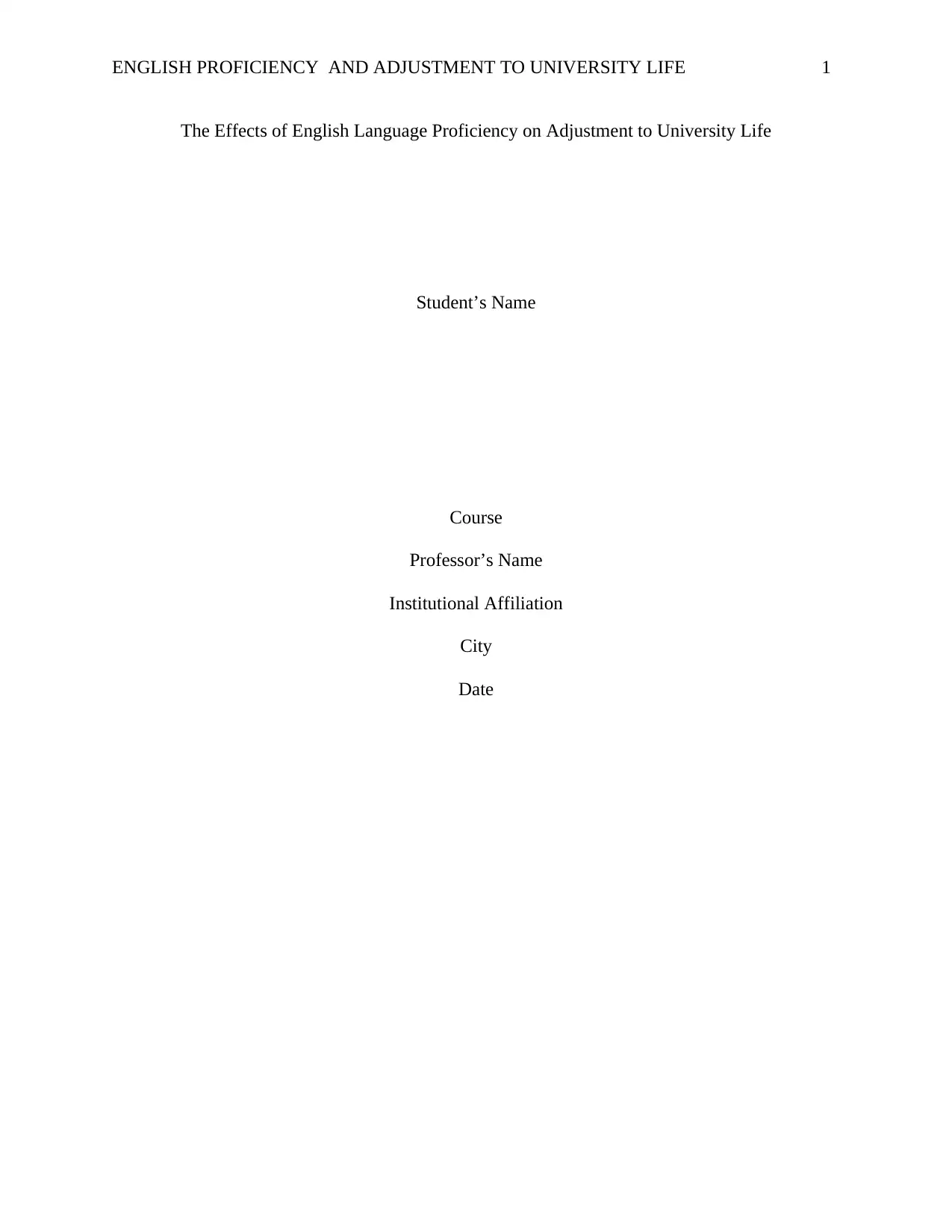
ENGLISH PROFICIENCY AND ADJUSTMENT TO UNIVERSITY LIFE 1
The Effects of English Language Proficiency on Adjustment to University Life
Student’s Name
Course
Professor’s Name
Institutional Affiliation
City
Date
The Effects of English Language Proficiency on Adjustment to University Life
Student’s Name
Course
Professor’s Name
Institutional Affiliation
City
Date
Paraphrase This Document
Need a fresh take? Get an instant paraphrase of this document with our AI Paraphraser
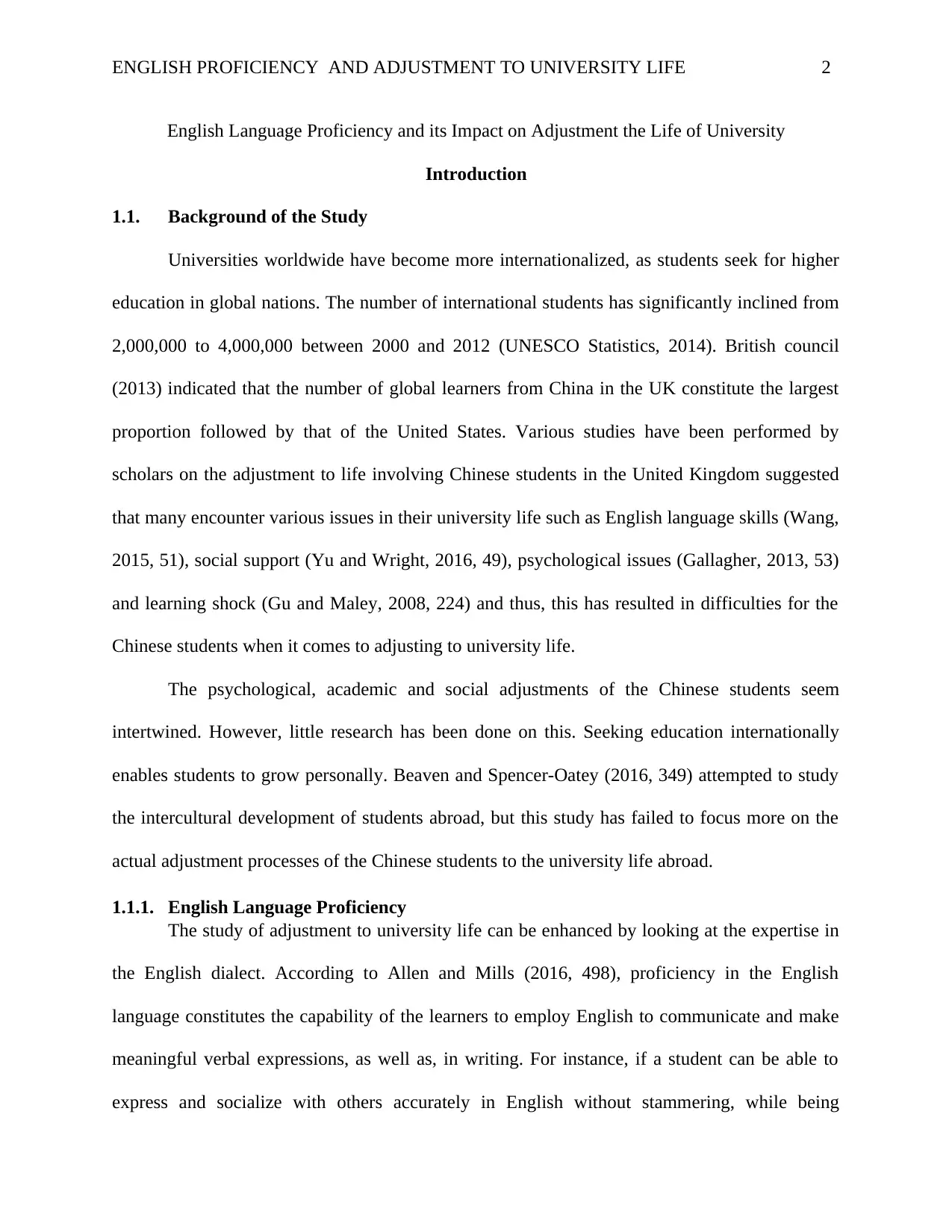
ENGLISH PROFICIENCY AND ADJUSTMENT TO UNIVERSITY LIFE 2
English Language Proficiency and its Impact on Adjustment the Life of University
Introduction
1.1. Background of the Study
Universities worldwide have become more internationalized, as students seek for higher
education in global nations. The number of international students has significantly inclined from
2,000,000 to 4,000,000 between 2000 and 2012 (UNESCO Statistics, 2014). British council
(2013) indicated that the number of global learners from China in the UK constitute the largest
proportion followed by that of the United States. Various studies have been performed by
scholars on the adjustment to life involving Chinese students in the United Kingdom suggested
that many encounter various issues in their university life such as English language skills (Wang,
2015, 51), social support (Yu and Wright, 2016, 49), psychological issues (Gallagher, 2013, 53)
and learning shock (Gu and Maley, 2008, 224) and thus, this has resulted in difficulties for the
Chinese students when it comes to adjusting to university life.
The psychological, academic and social adjustments of the Chinese students seem
intertwined. However, little research has been done on this. Seeking education internationally
enables students to grow personally. Beaven and Spencer-Oatey (2016, 349) attempted to study
the intercultural development of students abroad, but this study has failed to focus more on the
actual adjustment processes of the Chinese students to the university life abroad.
1.1.1. English Language Proficiency
The study of adjustment to university life can be enhanced by looking at the expertise in
the English dialect. According to Allen and Mills (2016, 498), proficiency in the English
language constitutes the capability of the learners to employ English to communicate and make
meaningful verbal expressions, as well as, in writing. For instance, if a student can be able to
express and socialize with others accurately in English without stammering, while being
English Language Proficiency and its Impact on Adjustment the Life of University
Introduction
1.1. Background of the Study
Universities worldwide have become more internationalized, as students seek for higher
education in global nations. The number of international students has significantly inclined from
2,000,000 to 4,000,000 between 2000 and 2012 (UNESCO Statistics, 2014). British council
(2013) indicated that the number of global learners from China in the UK constitute the largest
proportion followed by that of the United States. Various studies have been performed by
scholars on the adjustment to life involving Chinese students in the United Kingdom suggested
that many encounter various issues in their university life such as English language skills (Wang,
2015, 51), social support (Yu and Wright, 2016, 49), psychological issues (Gallagher, 2013, 53)
and learning shock (Gu and Maley, 2008, 224) and thus, this has resulted in difficulties for the
Chinese students when it comes to adjusting to university life.
The psychological, academic and social adjustments of the Chinese students seem
intertwined. However, little research has been done on this. Seeking education internationally
enables students to grow personally. Beaven and Spencer-Oatey (2016, 349) attempted to study
the intercultural development of students abroad, but this study has failed to focus more on the
actual adjustment processes of the Chinese students to the university life abroad.
1.1.1. English Language Proficiency
The study of adjustment to university life can be enhanced by looking at the expertise in
the English dialect. According to Allen and Mills (2016, 498), proficiency in the English
language constitutes the capability of the learners to employ English to communicate and make
meaningful verbal expressions, as well as, in writing. For instance, if a student can be able to
express and socialize with others accurately in English without stammering, while being
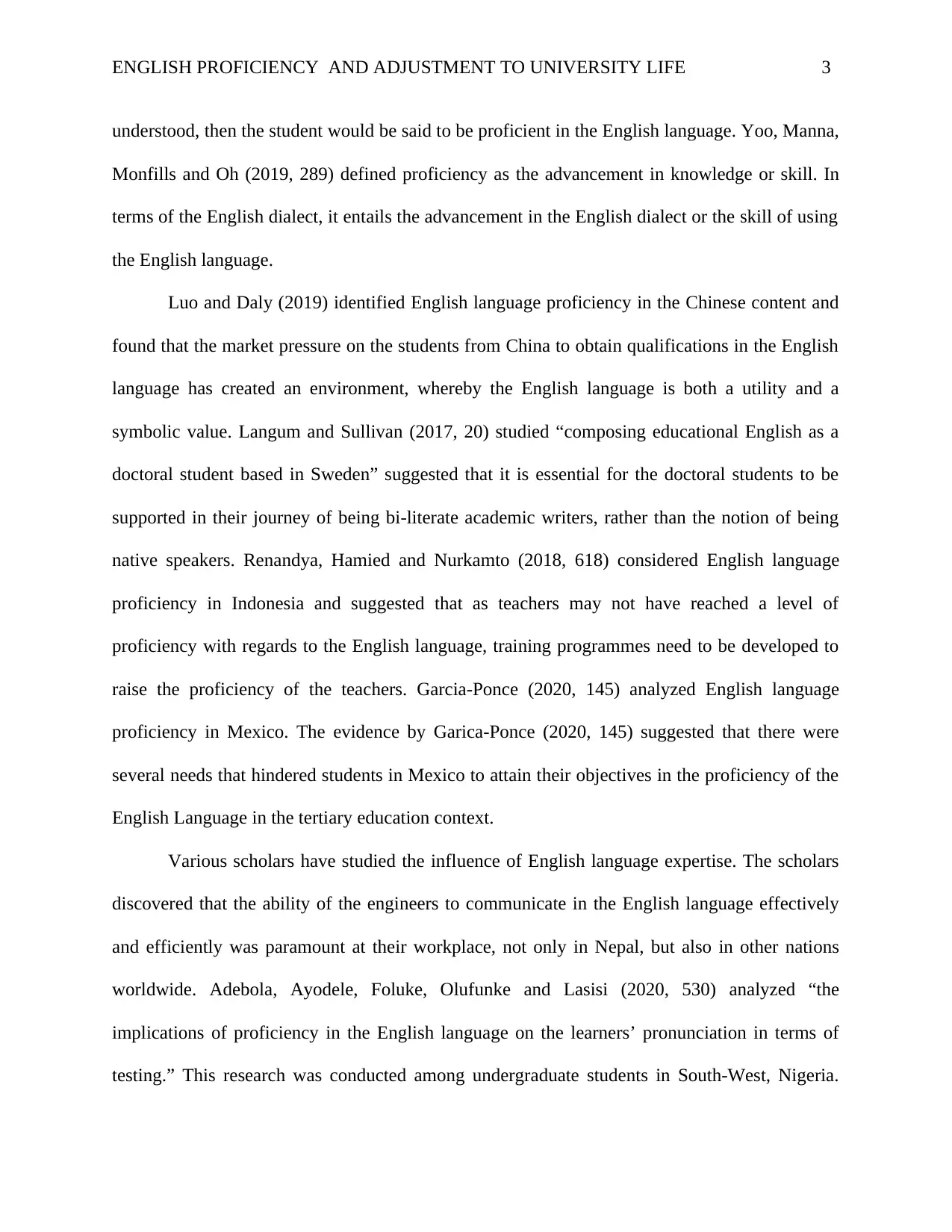
ENGLISH PROFICIENCY AND ADJUSTMENT TO UNIVERSITY LIFE 3
understood, then the student would be said to be proficient in the English language. Yoo, Manna,
Monfills and Oh (2019, 289) defined proficiency as the advancement in knowledge or skill. In
terms of the English dialect, it entails the advancement in the English dialect or the skill of using
the English language.
Luo and Daly (2019) identified English language proficiency in the Chinese content and
found that the market pressure on the students from China to obtain qualifications in the English
language has created an environment, whereby the English language is both a utility and a
symbolic value. Langum and Sullivan (2017, 20) studied “composing educational English as a
doctoral student based in Sweden” suggested that it is essential for the doctoral students to be
supported in their journey of being bi-literate academic writers, rather than the notion of being
native speakers. Renandya, Hamied and Nurkamto (2018, 618) considered English language
proficiency in Indonesia and suggested that as teachers may not have reached a level of
proficiency with regards to the English language, training programmes need to be developed to
raise the proficiency of the teachers. Garcia-Ponce (2020, 145) analyzed English language
proficiency in Mexico. The evidence by Garica-Ponce (2020, 145) suggested that there were
several needs that hindered students in Mexico to attain their objectives in the proficiency of the
English Language in the tertiary education context.
Various scholars have studied the influence of English language expertise. The scholars
discovered that the ability of the engineers to communicate in the English language effectively
and efficiently was paramount at their workplace, not only in Nepal, but also in other nations
worldwide. Adebola, Ayodele, Foluke, Olufunke and Lasisi (2020, 530) analyzed “the
implications of proficiency in the English language on the learners’ pronunciation in terms of
testing.” This research was conducted among undergraduate students in South-West, Nigeria.
understood, then the student would be said to be proficient in the English language. Yoo, Manna,
Monfills and Oh (2019, 289) defined proficiency as the advancement in knowledge or skill. In
terms of the English dialect, it entails the advancement in the English dialect or the skill of using
the English language.
Luo and Daly (2019) identified English language proficiency in the Chinese content and
found that the market pressure on the students from China to obtain qualifications in the English
language has created an environment, whereby the English language is both a utility and a
symbolic value. Langum and Sullivan (2017, 20) studied “composing educational English as a
doctoral student based in Sweden” suggested that it is essential for the doctoral students to be
supported in their journey of being bi-literate academic writers, rather than the notion of being
native speakers. Renandya, Hamied and Nurkamto (2018, 618) considered English language
proficiency in Indonesia and suggested that as teachers may not have reached a level of
proficiency with regards to the English language, training programmes need to be developed to
raise the proficiency of the teachers. Garcia-Ponce (2020, 145) analyzed English language
proficiency in Mexico. The evidence by Garica-Ponce (2020, 145) suggested that there were
several needs that hindered students in Mexico to attain their objectives in the proficiency of the
English Language in the tertiary education context.
Various scholars have studied the influence of English language expertise. The scholars
discovered that the ability of the engineers to communicate in the English language effectively
and efficiently was paramount at their workplace, not only in Nepal, but also in other nations
worldwide. Adebola, Ayodele, Foluke, Olufunke and Lasisi (2020, 530) analyzed “the
implications of proficiency in the English language on the learners’ pronunciation in terms of
testing.” This research was conducted among undergraduate students in South-West, Nigeria.
⊘ This is a preview!⊘
Do you want full access?
Subscribe today to unlock all pages.

Trusted by 1+ million students worldwide
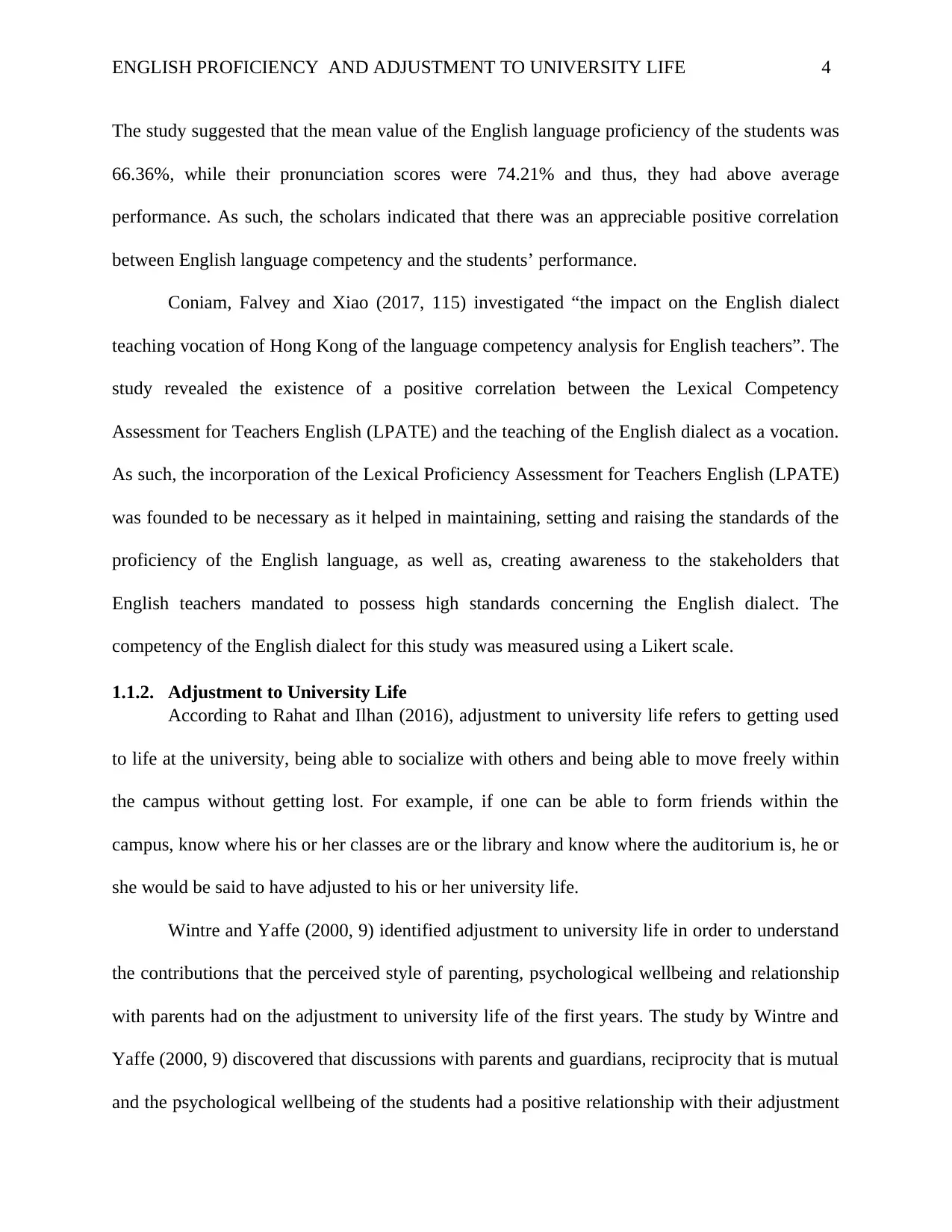
ENGLISH PROFICIENCY AND ADJUSTMENT TO UNIVERSITY LIFE 4
The study suggested that the mean value of the English language proficiency of the students was
66.36%, while their pronunciation scores were 74.21% and thus, they had above average
performance. As such, the scholars indicated that there was an appreciable positive correlation
between English language competency and the students’ performance.
Coniam, Falvey and Xiao (2017, 115) investigated “the impact on the English dialect
teaching vocation of Hong Kong of the language competency analysis for English teachers”. The
study revealed the existence of a positive correlation between the Lexical Competency
Assessment for Teachers English (LPATE) and the teaching of the English dialect as a vocation.
As such, the incorporation of the Lexical Proficiency Assessment for Teachers English (LPATE)
was founded to be necessary as it helped in maintaining, setting and raising the standards of the
proficiency of the English language, as well as, creating awareness to the stakeholders that
English teachers mandated to possess high standards concerning the English dialect. The
competency of the English dialect for this study was measured using a Likert scale.
1.1.2. Adjustment to University Life
According to Rahat and Ilhan (2016), adjustment to university life refers to getting used
to life at the university, being able to socialize with others and being able to move freely within
the campus without getting lost. For example, if one can be able to form friends within the
campus, know where his or her classes are or the library and know where the auditorium is, he or
she would be said to have adjusted to his or her university life.
Wintre and Yaffe (2000, 9) identified adjustment to university life in order to understand
the contributions that the perceived style of parenting, psychological wellbeing and relationship
with parents had on the adjustment to university life of the first years. The study by Wintre and
Yaffe (2000, 9) discovered that discussions with parents and guardians, reciprocity that is mutual
and the psychological wellbeing of the students had a positive relationship with their adjustment
The study suggested that the mean value of the English language proficiency of the students was
66.36%, while their pronunciation scores were 74.21% and thus, they had above average
performance. As such, the scholars indicated that there was an appreciable positive correlation
between English language competency and the students’ performance.
Coniam, Falvey and Xiao (2017, 115) investigated “the impact on the English dialect
teaching vocation of Hong Kong of the language competency analysis for English teachers”. The
study revealed the existence of a positive correlation between the Lexical Competency
Assessment for Teachers English (LPATE) and the teaching of the English dialect as a vocation.
As such, the incorporation of the Lexical Proficiency Assessment for Teachers English (LPATE)
was founded to be necessary as it helped in maintaining, setting and raising the standards of the
proficiency of the English language, as well as, creating awareness to the stakeholders that
English teachers mandated to possess high standards concerning the English dialect. The
competency of the English dialect for this study was measured using a Likert scale.
1.1.2. Adjustment to University Life
According to Rahat and Ilhan (2016), adjustment to university life refers to getting used
to life at the university, being able to socialize with others and being able to move freely within
the campus without getting lost. For example, if one can be able to form friends within the
campus, know where his or her classes are or the library and know where the auditorium is, he or
she would be said to have adjusted to his or her university life.
Wintre and Yaffe (2000, 9) identified adjustment to university life in order to understand
the contributions that the perceived style of parenting, psychological wellbeing and relationship
with parents had on the adjustment to university life of the first years. The study by Wintre and
Yaffe (2000, 9) discovered that discussions with parents and guardians, reciprocity that is mutual
and the psychological wellbeing of the students had a positive relationship with their adjustment
Paraphrase This Document
Need a fresh take? Get an instant paraphrase of this document with our AI Paraphraser
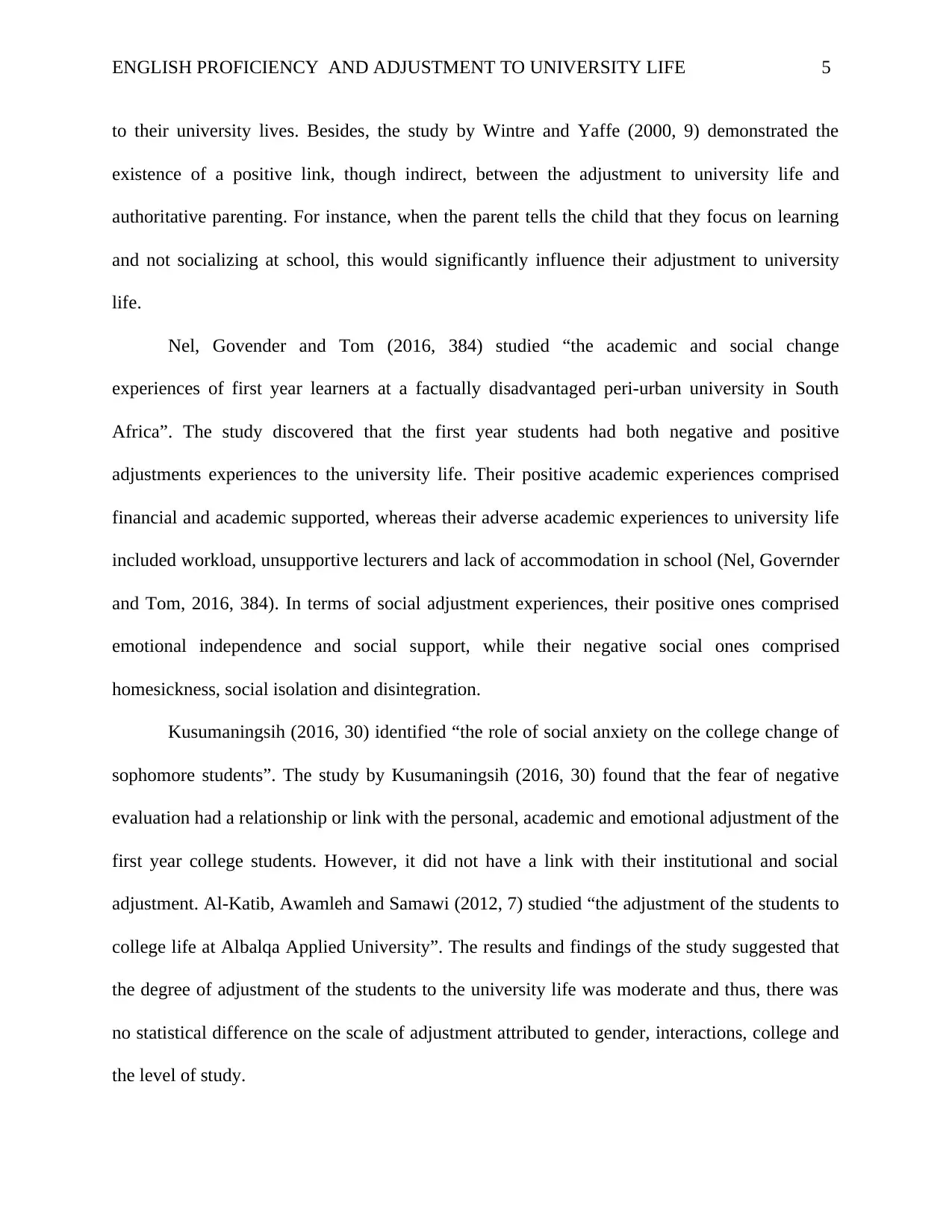
ENGLISH PROFICIENCY AND ADJUSTMENT TO UNIVERSITY LIFE 5
to their university lives. Besides, the study by Wintre and Yaffe (2000, 9) demonstrated the
existence of a positive link, though indirect, between the adjustment to university life and
authoritative parenting. For instance, when the parent tells the child that they focus on learning
and not socializing at school, this would significantly influence their adjustment to university
life.
Nel, Govender and Tom (2016, 384) studied “the academic and social change
experiences of first year learners at a factually disadvantaged peri-urban university in South
Africa”. The study discovered that the first year students had both negative and positive
adjustments experiences to the university life. Their positive academic experiences comprised
financial and academic supported, whereas their adverse academic experiences to university life
included workload, unsupportive lecturers and lack of accommodation in school (Nel, Governder
and Tom, 2016, 384). In terms of social adjustment experiences, their positive ones comprised
emotional independence and social support, while their negative social ones comprised
homesickness, social isolation and disintegration.
Kusumaningsih (2016, 30) identified “the role of social anxiety on the college change of
sophomore students”. The study by Kusumaningsih (2016, 30) found that the fear of negative
evaluation had a relationship or link with the personal, academic and emotional adjustment of the
first year college students. However, it did not have a link with their institutional and social
adjustment. Al-Katib, Awamleh and Samawi (2012, 7) studied “the adjustment of the students to
college life at Albalqa Applied University”. The results and findings of the study suggested that
the degree of adjustment of the students to the university life was moderate and thus, there was
no statistical difference on the scale of adjustment attributed to gender, interactions, college and
the level of study.
to their university lives. Besides, the study by Wintre and Yaffe (2000, 9) demonstrated the
existence of a positive link, though indirect, between the adjustment to university life and
authoritative parenting. For instance, when the parent tells the child that they focus on learning
and not socializing at school, this would significantly influence their adjustment to university
life.
Nel, Govender and Tom (2016, 384) studied “the academic and social change
experiences of first year learners at a factually disadvantaged peri-urban university in South
Africa”. The study discovered that the first year students had both negative and positive
adjustments experiences to the university life. Their positive academic experiences comprised
financial and academic supported, whereas their adverse academic experiences to university life
included workload, unsupportive lecturers and lack of accommodation in school (Nel, Governder
and Tom, 2016, 384). In terms of social adjustment experiences, their positive ones comprised
emotional independence and social support, while their negative social ones comprised
homesickness, social isolation and disintegration.
Kusumaningsih (2016, 30) identified “the role of social anxiety on the college change of
sophomore students”. The study by Kusumaningsih (2016, 30) found that the fear of negative
evaluation had a relationship or link with the personal, academic and emotional adjustment of the
first year college students. However, it did not have a link with their institutional and social
adjustment. Al-Katib, Awamleh and Samawi (2012, 7) studied “the adjustment of the students to
college life at Albalqa Applied University”. The results and findings of the study suggested that
the degree of adjustment of the students to the university life was moderate and thus, there was
no statistical difference on the scale of adjustment attributed to gender, interactions, college and
the level of study.
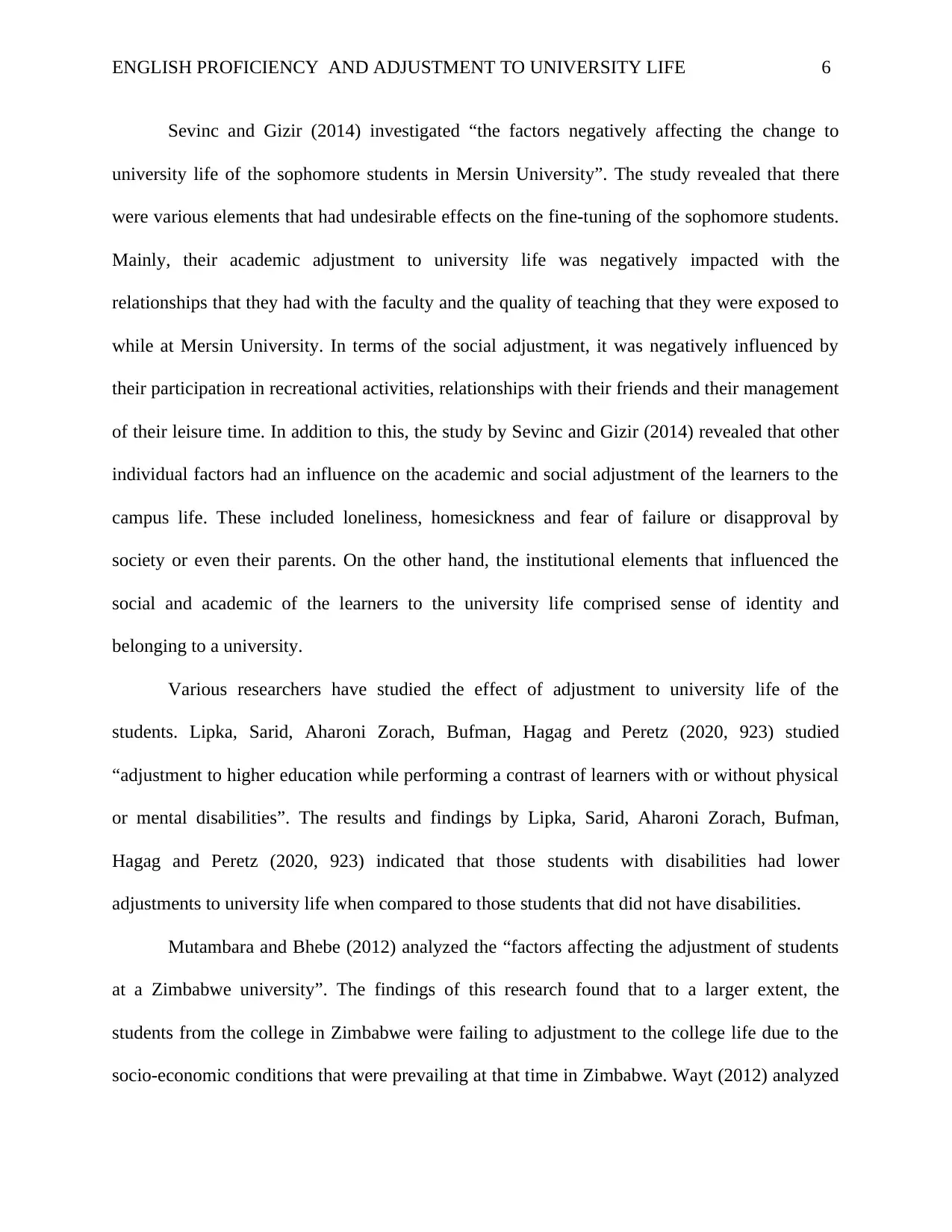
ENGLISH PROFICIENCY AND ADJUSTMENT TO UNIVERSITY LIFE 6
Sevinc and Gizir (2014) investigated “the factors negatively affecting the change to
university life of the sophomore students in Mersin University”. The study revealed that there
were various elements that had undesirable effects on the fine-tuning of the sophomore students.
Mainly, their academic adjustment to university life was negatively impacted with the
relationships that they had with the faculty and the quality of teaching that they were exposed to
while at Mersin University. In terms of the social adjustment, it was negatively influenced by
their participation in recreational activities, relationships with their friends and their management
of their leisure time. In addition to this, the study by Sevinc and Gizir (2014) revealed that other
individual factors had an influence on the academic and social adjustment of the learners to the
campus life. These included loneliness, homesickness and fear of failure or disapproval by
society or even their parents. On the other hand, the institutional elements that influenced the
social and academic of the learners to the university life comprised sense of identity and
belonging to a university.
Various researchers have studied the effect of adjustment to university life of the
students. Lipka, Sarid, Aharoni Zorach, Bufman, Hagag and Peretz (2020, 923) studied
“adjustment to higher education while performing a contrast of learners with or without physical
or mental disabilities”. The results and findings by Lipka, Sarid, Aharoni Zorach, Bufman,
Hagag and Peretz (2020, 923) indicated that those students with disabilities had lower
adjustments to university life when compared to those students that did not have disabilities.
Mutambara and Bhebe (2012) analyzed the “factors affecting the adjustment of students
at a Zimbabwe university”. The findings of this research found that to a larger extent, the
students from the college in Zimbabwe were failing to adjustment to the college life due to the
socio-economic conditions that were prevailing at that time in Zimbabwe. Wayt (2012) analyzed
Sevinc and Gizir (2014) investigated “the factors negatively affecting the change to
university life of the sophomore students in Mersin University”. The study revealed that there
were various elements that had undesirable effects on the fine-tuning of the sophomore students.
Mainly, their academic adjustment to university life was negatively impacted with the
relationships that they had with the faculty and the quality of teaching that they were exposed to
while at Mersin University. In terms of the social adjustment, it was negatively influenced by
their participation in recreational activities, relationships with their friends and their management
of their leisure time. In addition to this, the study by Sevinc and Gizir (2014) revealed that other
individual factors had an influence on the academic and social adjustment of the learners to the
campus life. These included loneliness, homesickness and fear of failure or disapproval by
society or even their parents. On the other hand, the institutional elements that influenced the
social and academic of the learners to the university life comprised sense of identity and
belonging to a university.
Various researchers have studied the effect of adjustment to university life of the
students. Lipka, Sarid, Aharoni Zorach, Bufman, Hagag and Peretz (2020, 923) studied
“adjustment to higher education while performing a contrast of learners with or without physical
or mental disabilities”. The results and findings by Lipka, Sarid, Aharoni Zorach, Bufman,
Hagag and Peretz (2020, 923) indicated that those students with disabilities had lower
adjustments to university life when compared to those students that did not have disabilities.
Mutambara and Bhebe (2012) analyzed the “factors affecting the adjustment of students
at a Zimbabwe university”. The findings of this research found that to a larger extent, the
students from the college in Zimbabwe were failing to adjustment to the college life due to the
socio-economic conditions that were prevailing at that time in Zimbabwe. Wayt (2012) analyzed
⊘ This is a preview!⊘
Do you want full access?
Subscribe today to unlock all pages.

Trusted by 1+ million students worldwide
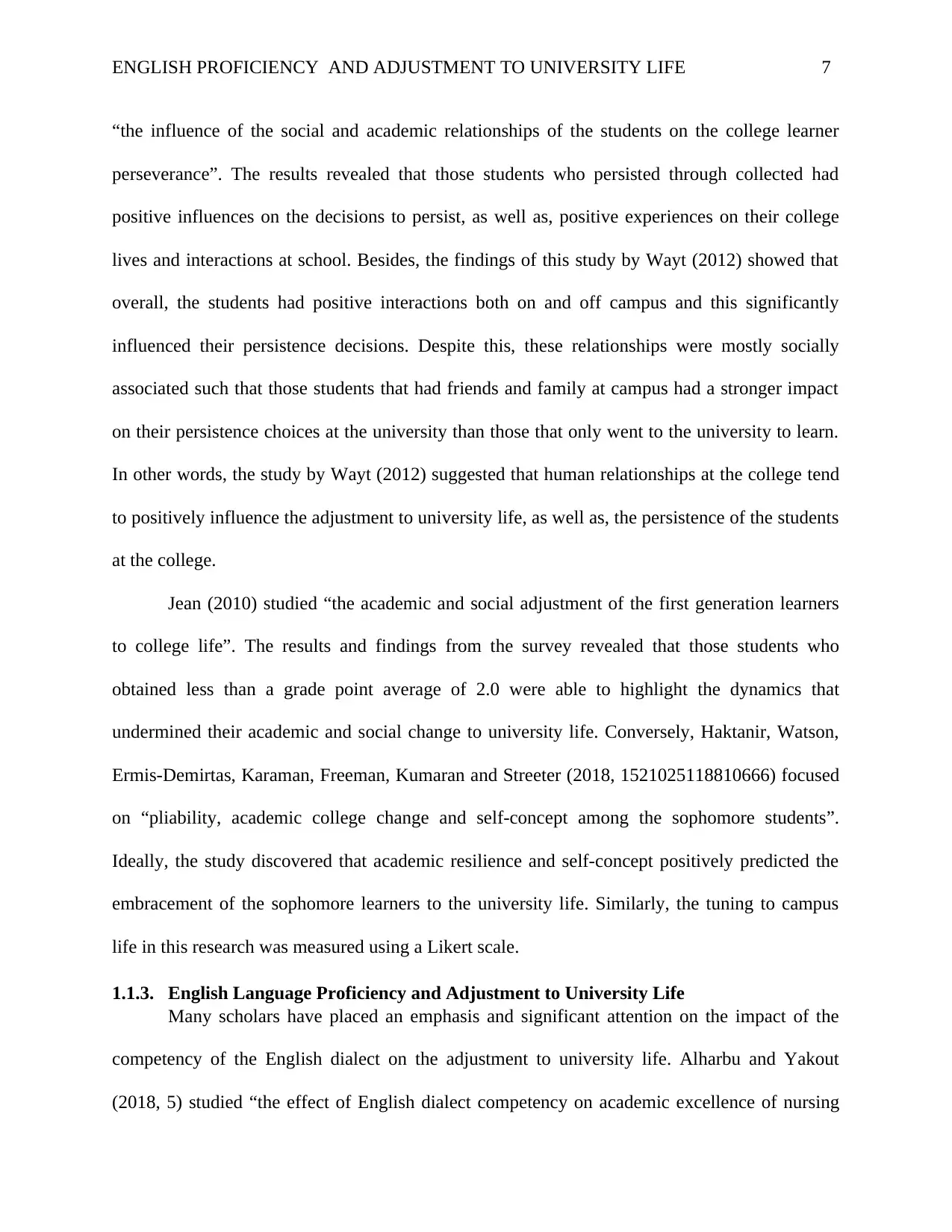
ENGLISH PROFICIENCY AND ADJUSTMENT TO UNIVERSITY LIFE 7
“the influence of the social and academic relationships of the students on the college learner
perseverance”. The results revealed that those students who persisted through collected had
positive influences on the decisions to persist, as well as, positive experiences on their college
lives and interactions at school. Besides, the findings of this study by Wayt (2012) showed that
overall, the students had positive interactions both on and off campus and this significantly
influenced their persistence decisions. Despite this, these relationships were mostly socially
associated such that those students that had friends and family at campus had a stronger impact
on their persistence choices at the university than those that only went to the university to learn.
In other words, the study by Wayt (2012) suggested that human relationships at the college tend
to positively influence the adjustment to university life, as well as, the persistence of the students
at the college.
Jean (2010) studied “the academic and social adjustment of the first generation learners
to college life”. The results and findings from the survey revealed that those students who
obtained less than a grade point average of 2.0 were able to highlight the dynamics that
undermined their academic and social change to university life. Conversely, Haktanir, Watson,
Ermis-Demirtas, Karaman, Freeman, Kumaran and Streeter (2018, 1521025118810666) focused
on “pliability, academic college change and self-concept among the sophomore students”.
Ideally, the study discovered that academic resilience and self-concept positively predicted the
embracement of the sophomore learners to the university life. Similarly, the tuning to campus
life in this research was measured using a Likert scale.
1.1.3. English Language Proficiency and Adjustment to University Life
Many scholars have placed an emphasis and significant attention on the impact of the
competency of the English dialect on the adjustment to university life. Alharbu and Yakout
(2018, 5) studied “the effect of English dialect competency on academic excellence of nursing
“the influence of the social and academic relationships of the students on the college learner
perseverance”. The results revealed that those students who persisted through collected had
positive influences on the decisions to persist, as well as, positive experiences on their college
lives and interactions at school. Besides, the findings of this study by Wayt (2012) showed that
overall, the students had positive interactions both on and off campus and this significantly
influenced their persistence decisions. Despite this, these relationships were mostly socially
associated such that those students that had friends and family at campus had a stronger impact
on their persistence choices at the university than those that only went to the university to learn.
In other words, the study by Wayt (2012) suggested that human relationships at the college tend
to positively influence the adjustment to university life, as well as, the persistence of the students
at the college.
Jean (2010) studied “the academic and social adjustment of the first generation learners
to college life”. The results and findings from the survey revealed that those students who
obtained less than a grade point average of 2.0 were able to highlight the dynamics that
undermined their academic and social change to university life. Conversely, Haktanir, Watson,
Ermis-Demirtas, Karaman, Freeman, Kumaran and Streeter (2018, 1521025118810666) focused
on “pliability, academic college change and self-concept among the sophomore students”.
Ideally, the study discovered that academic resilience and self-concept positively predicted the
embracement of the sophomore learners to the university life. Similarly, the tuning to campus
life in this research was measured using a Likert scale.
1.1.3. English Language Proficiency and Adjustment to University Life
Many scholars have placed an emphasis and significant attention on the impact of the
competency of the English dialect on the adjustment to university life. Alharbu and Yakout
(2018, 5) studied “the effect of English dialect competency on academic excellence of nursing
Paraphrase This Document
Need a fresh take? Get an instant paraphrase of this document with our AI Paraphraser
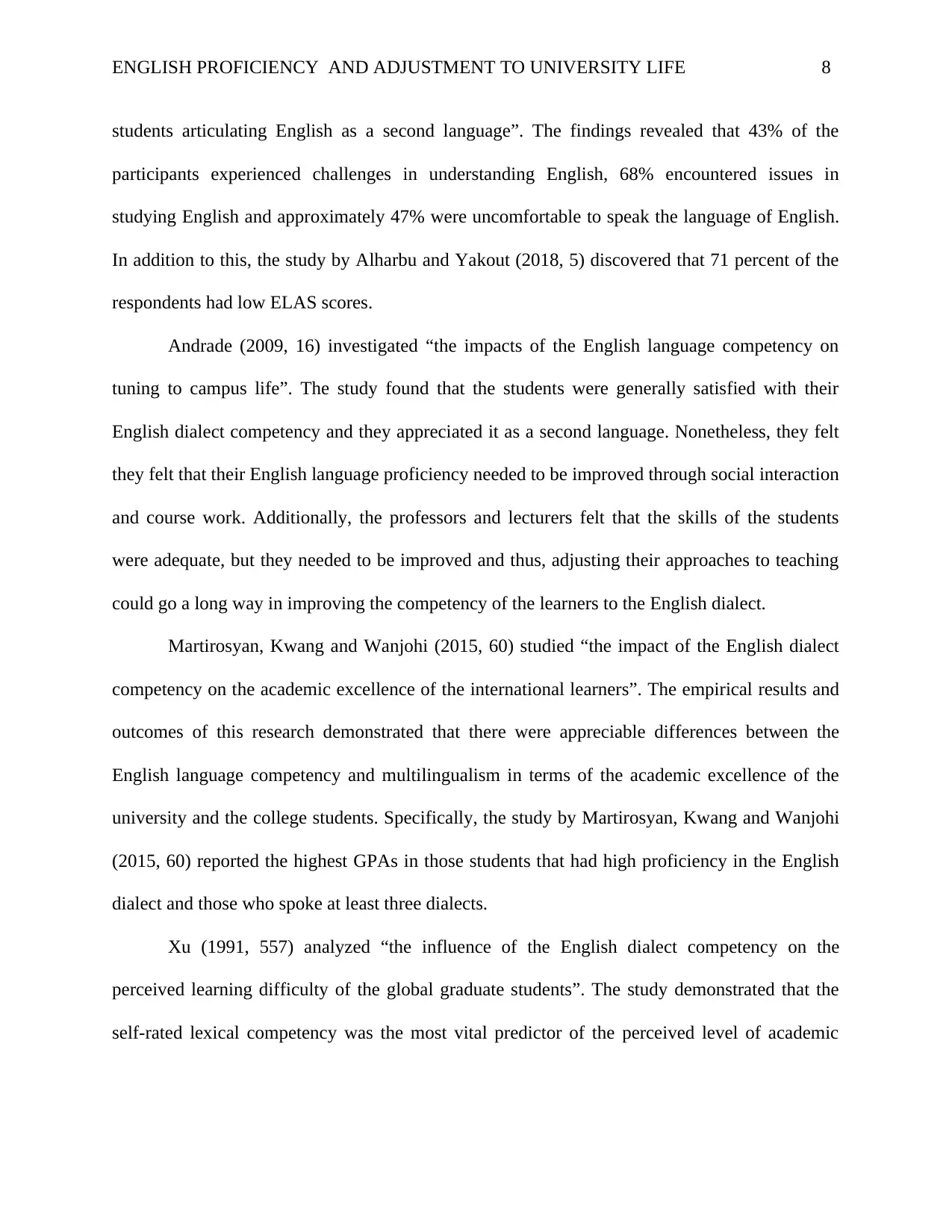
ENGLISH PROFICIENCY AND ADJUSTMENT TO UNIVERSITY LIFE 8
students articulating English as a second language”. The findings revealed that 43% of the
participants experienced challenges in understanding English, 68% encountered issues in
studying English and approximately 47% were uncomfortable to speak the language of English.
In addition to this, the study by Alharbu and Yakout (2018, 5) discovered that 71 percent of the
respondents had low ELAS scores.
Andrade (2009, 16) investigated “the impacts of the English language competency on
tuning to campus life”. The study found that the students were generally satisfied with their
English dialect competency and they appreciated it as a second language. Nonetheless, they felt
they felt that their English language proficiency needed to be improved through social interaction
and course work. Additionally, the professors and lecturers felt that the skills of the students
were adequate, but they needed to be improved and thus, adjusting their approaches to teaching
could go a long way in improving the competency of the learners to the English dialect.
Martirosyan, Kwang and Wanjohi (2015, 60) studied “the impact of the English dialect
competency on the academic excellence of the international learners”. The empirical results and
outcomes of this research demonstrated that there were appreciable differences between the
English language competency and multilingualism in terms of the academic excellence of the
university and the college students. Specifically, the study by Martirosyan, Kwang and Wanjohi
(2015, 60) reported the highest GPAs in those students that had high proficiency in the English
dialect and those who spoke at least three dialects.
Xu (1991, 557) analyzed “the influence of the English dialect competency on the
perceived learning difficulty of the global graduate students”. The study demonstrated that the
self-rated lexical competency was the most vital predictor of the perceived level of academic
students articulating English as a second language”. The findings revealed that 43% of the
participants experienced challenges in understanding English, 68% encountered issues in
studying English and approximately 47% were uncomfortable to speak the language of English.
In addition to this, the study by Alharbu and Yakout (2018, 5) discovered that 71 percent of the
respondents had low ELAS scores.
Andrade (2009, 16) investigated “the impacts of the English language competency on
tuning to campus life”. The study found that the students were generally satisfied with their
English dialect competency and they appreciated it as a second language. Nonetheless, they felt
they felt that their English language proficiency needed to be improved through social interaction
and course work. Additionally, the professors and lecturers felt that the skills of the students
were adequate, but they needed to be improved and thus, adjusting their approaches to teaching
could go a long way in improving the competency of the learners to the English dialect.
Martirosyan, Kwang and Wanjohi (2015, 60) studied “the impact of the English dialect
competency on the academic excellence of the international learners”. The empirical results and
outcomes of this research demonstrated that there were appreciable differences between the
English language competency and multilingualism in terms of the academic excellence of the
university and the college students. Specifically, the study by Martirosyan, Kwang and Wanjohi
(2015, 60) reported the highest GPAs in those students that had high proficiency in the English
dialect and those who spoke at least three dialects.
Xu (1991, 557) analyzed “the influence of the English dialect competency on the
perceived learning difficulty of the global graduate students”. The study demonstrated that the
self-rated lexical competency was the most vital predictor of the perceived level of academic
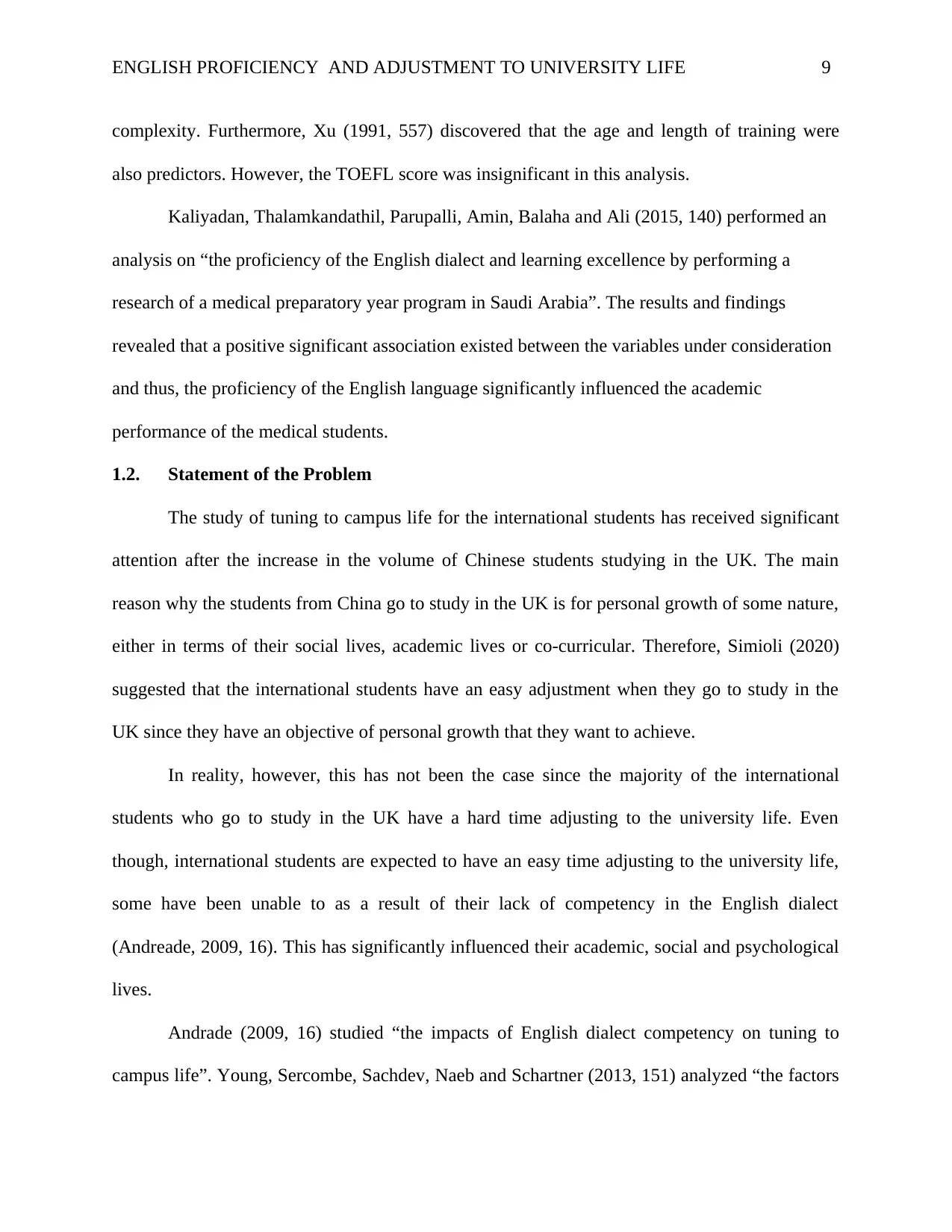
ENGLISH PROFICIENCY AND ADJUSTMENT TO UNIVERSITY LIFE 9
complexity. Furthermore, Xu (1991, 557) discovered that the age and length of training were
also predictors. However, the TOEFL score was insignificant in this analysis.
Kaliyadan, Thalamkandathil, Parupalli, Amin, Balaha and Ali (2015, 140) performed an
analysis on “the proficiency of the English dialect and learning excellence by performing a
research of a medical preparatory year program in Saudi Arabia”. The results and findings
revealed that a positive significant association existed between the variables under consideration
and thus, the proficiency of the English language significantly influenced the academic
performance of the medical students.
1.2. Statement of the Problem
The study of tuning to campus life for the international students has received significant
attention after the increase in the volume of Chinese students studying in the UK. The main
reason why the students from China go to study in the UK is for personal growth of some nature,
either in terms of their social lives, academic lives or co-curricular. Therefore, Simioli (2020)
suggested that the international students have an easy adjustment when they go to study in the
UK since they have an objective of personal growth that they want to achieve.
In reality, however, this has not been the case since the majority of the international
students who go to study in the UK have a hard time adjusting to the university life. Even
though, international students are expected to have an easy time adjusting to the university life,
some have been unable to as a result of their lack of competency in the English dialect
(Andreade, 2009, 16). This has significantly influenced their academic, social and psychological
lives.
Andrade (2009, 16) studied “the impacts of English dialect competency on tuning to
campus life”. Young, Sercombe, Sachdev, Naeb and Schartner (2013, 151) analyzed “the factors
complexity. Furthermore, Xu (1991, 557) discovered that the age and length of training were
also predictors. However, the TOEFL score was insignificant in this analysis.
Kaliyadan, Thalamkandathil, Parupalli, Amin, Balaha and Ali (2015, 140) performed an
analysis on “the proficiency of the English dialect and learning excellence by performing a
research of a medical preparatory year program in Saudi Arabia”. The results and findings
revealed that a positive significant association existed between the variables under consideration
and thus, the proficiency of the English language significantly influenced the academic
performance of the medical students.
1.2. Statement of the Problem
The study of tuning to campus life for the international students has received significant
attention after the increase in the volume of Chinese students studying in the UK. The main
reason why the students from China go to study in the UK is for personal growth of some nature,
either in terms of their social lives, academic lives or co-curricular. Therefore, Simioli (2020)
suggested that the international students have an easy adjustment when they go to study in the
UK since they have an objective of personal growth that they want to achieve.
In reality, however, this has not been the case since the majority of the international
students who go to study in the UK have a hard time adjusting to the university life. Even
though, international students are expected to have an easy time adjusting to the university life,
some have been unable to as a result of their lack of competency in the English dialect
(Andreade, 2009, 16). This has significantly influenced their academic, social and psychological
lives.
Andrade (2009, 16) studied “the impacts of English dialect competency on tuning to
campus life”. Young, Sercombe, Sachdev, Naeb and Schartner (2013, 151) analyzed “the factors
⊘ This is a preview!⊘
Do you want full access?
Subscribe today to unlock all pages.

Trusted by 1+ million students worldwide
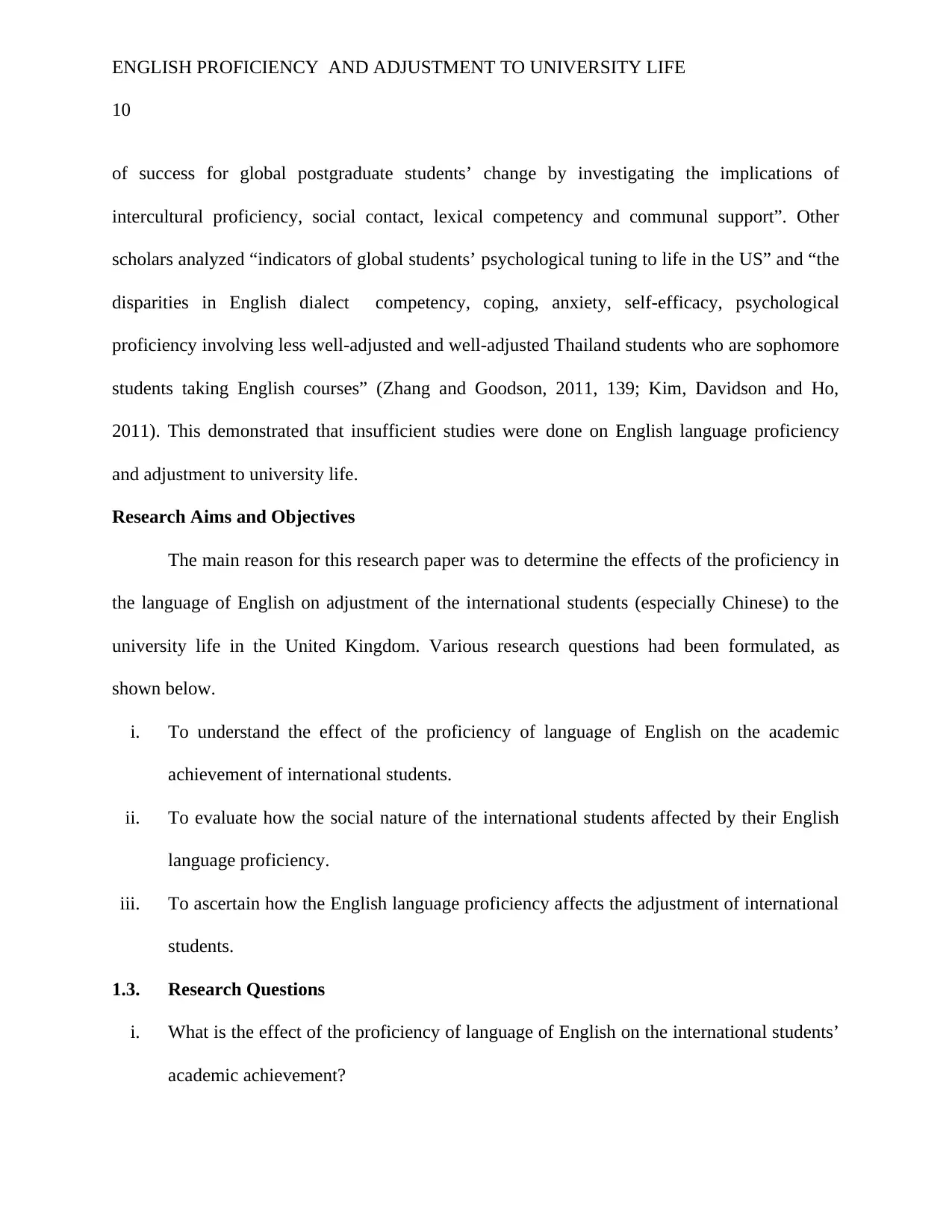
ENGLISH PROFICIENCY AND ADJUSTMENT TO UNIVERSITY LIFE
10
of success for global postgraduate students’ change by investigating the implications of
intercultural proficiency, social contact, lexical competency and communal support”. Other
scholars analyzed “indicators of global students’ psychological tuning to life in the US” and “the
disparities in English dialect competency, coping, anxiety, self-efficacy, psychological
proficiency involving less well-adjusted and well-adjusted Thailand students who are sophomore
students taking English courses” (Zhang and Goodson, 2011, 139; Kim, Davidson and Ho,
2011). This demonstrated that insufficient studies were done on English language proficiency
and adjustment to university life.
Research Aims and Objectives
The main reason for this research paper was to determine the effects of the proficiency in
the language of English on adjustment of the international students (especially Chinese) to the
university life in the United Kingdom. Various research questions had been formulated, as
shown below.
i. To understand the effect of the proficiency of language of English on the academic
achievement of international students.
ii. To evaluate how the social nature of the international students affected by their English
language proficiency.
iii. To ascertain how the English language proficiency affects the adjustment of international
students.
1.3. Research Questions
i. What is the effect of the proficiency of language of English on the international students’
academic achievement?
10
of success for global postgraduate students’ change by investigating the implications of
intercultural proficiency, social contact, lexical competency and communal support”. Other
scholars analyzed “indicators of global students’ psychological tuning to life in the US” and “the
disparities in English dialect competency, coping, anxiety, self-efficacy, psychological
proficiency involving less well-adjusted and well-adjusted Thailand students who are sophomore
students taking English courses” (Zhang and Goodson, 2011, 139; Kim, Davidson and Ho,
2011). This demonstrated that insufficient studies were done on English language proficiency
and adjustment to university life.
Research Aims and Objectives
The main reason for this research paper was to determine the effects of the proficiency in
the language of English on adjustment of the international students (especially Chinese) to the
university life in the United Kingdom. Various research questions had been formulated, as
shown below.
i. To understand the effect of the proficiency of language of English on the academic
achievement of international students.
ii. To evaluate how the social nature of the international students affected by their English
language proficiency.
iii. To ascertain how the English language proficiency affects the adjustment of international
students.
1.3. Research Questions
i. What is the effect of the proficiency of language of English on the international students’
academic achievement?
Paraphrase This Document
Need a fresh take? Get an instant paraphrase of this document with our AI Paraphraser
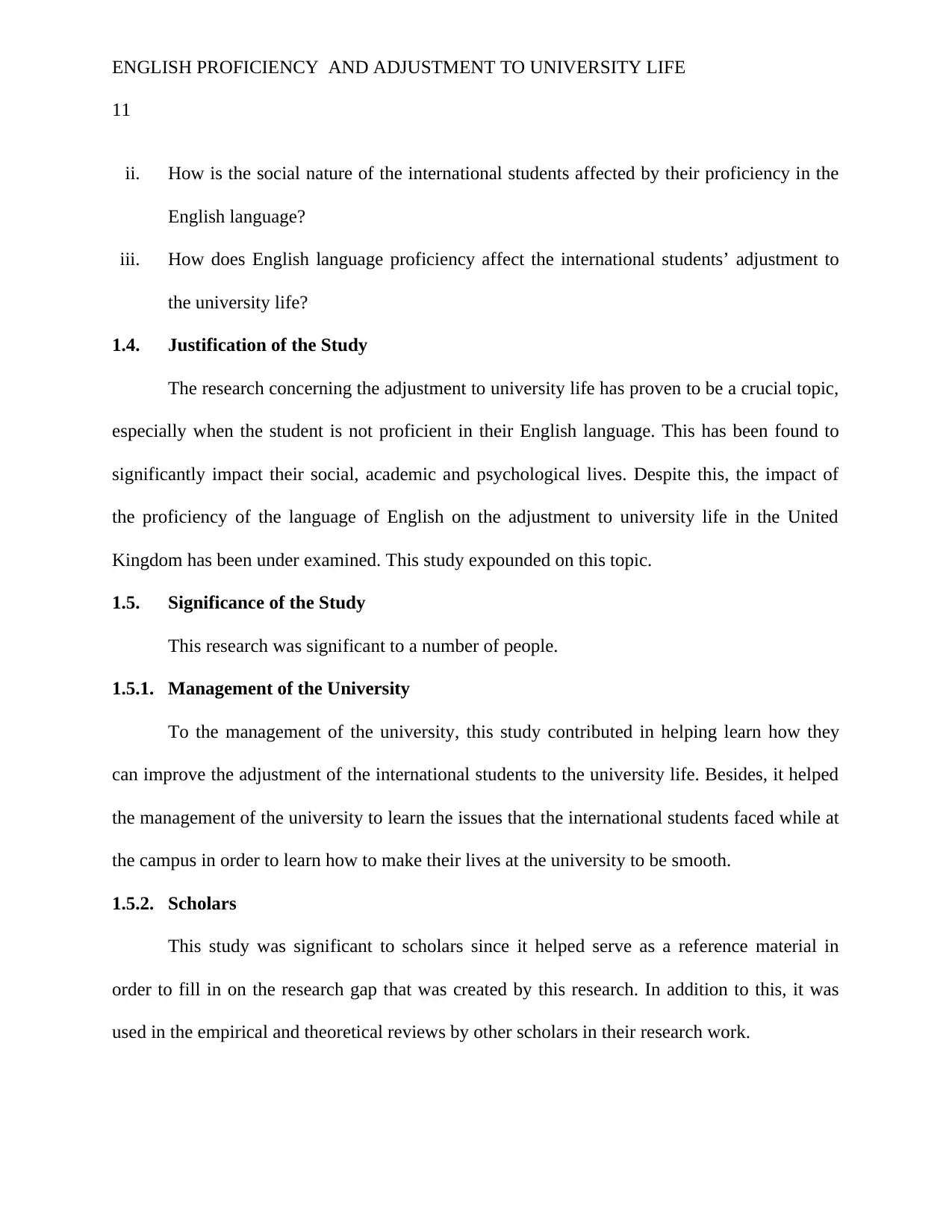
ENGLISH PROFICIENCY AND ADJUSTMENT TO UNIVERSITY LIFE
11
ii. How is the social nature of the international students affected by their proficiency in the
English language?
iii. How does English language proficiency affect the international students’ adjustment to
the university life?
1.4. Justification of the Study
The research concerning the adjustment to university life has proven to be a crucial topic,
especially when the student is not proficient in their English language. This has been found to
significantly impact their social, academic and psychological lives. Despite this, the impact of
the proficiency of the language of English on the adjustment to university life in the United
Kingdom has been under examined. This study expounded on this topic.
1.5. Significance of the Study
This research was significant to a number of people.
1.5.1. Management of the University
To the management of the university, this study contributed in helping learn how they
can improve the adjustment of the international students to the university life. Besides, it helped
the management of the university to learn the issues that the international students faced while at
the campus in order to learn how to make their lives at the university to be smooth.
1.5.2. Scholars
This study was significant to scholars since it helped serve as a reference material in
order to fill in on the research gap that was created by this research. In addition to this, it was
used in the empirical and theoretical reviews by other scholars in their research work.
11
ii. How is the social nature of the international students affected by their proficiency in the
English language?
iii. How does English language proficiency affect the international students’ adjustment to
the university life?
1.4. Justification of the Study
The research concerning the adjustment to university life has proven to be a crucial topic,
especially when the student is not proficient in their English language. This has been found to
significantly impact their social, academic and psychological lives. Despite this, the impact of
the proficiency of the language of English on the adjustment to university life in the United
Kingdom has been under examined. This study expounded on this topic.
1.5. Significance of the Study
This research was significant to a number of people.
1.5.1. Management of the University
To the management of the university, this study contributed in helping learn how they
can improve the adjustment of the international students to the university life. Besides, it helped
the management of the university to learn the issues that the international students faced while at
the campus in order to learn how to make their lives at the university to be smooth.
1.5.2. Scholars
This study was significant to scholars since it helped serve as a reference material in
order to fill in on the research gap that was created by this research. In addition to this, it was
used in the empirical and theoretical reviews by other scholars in their research work.
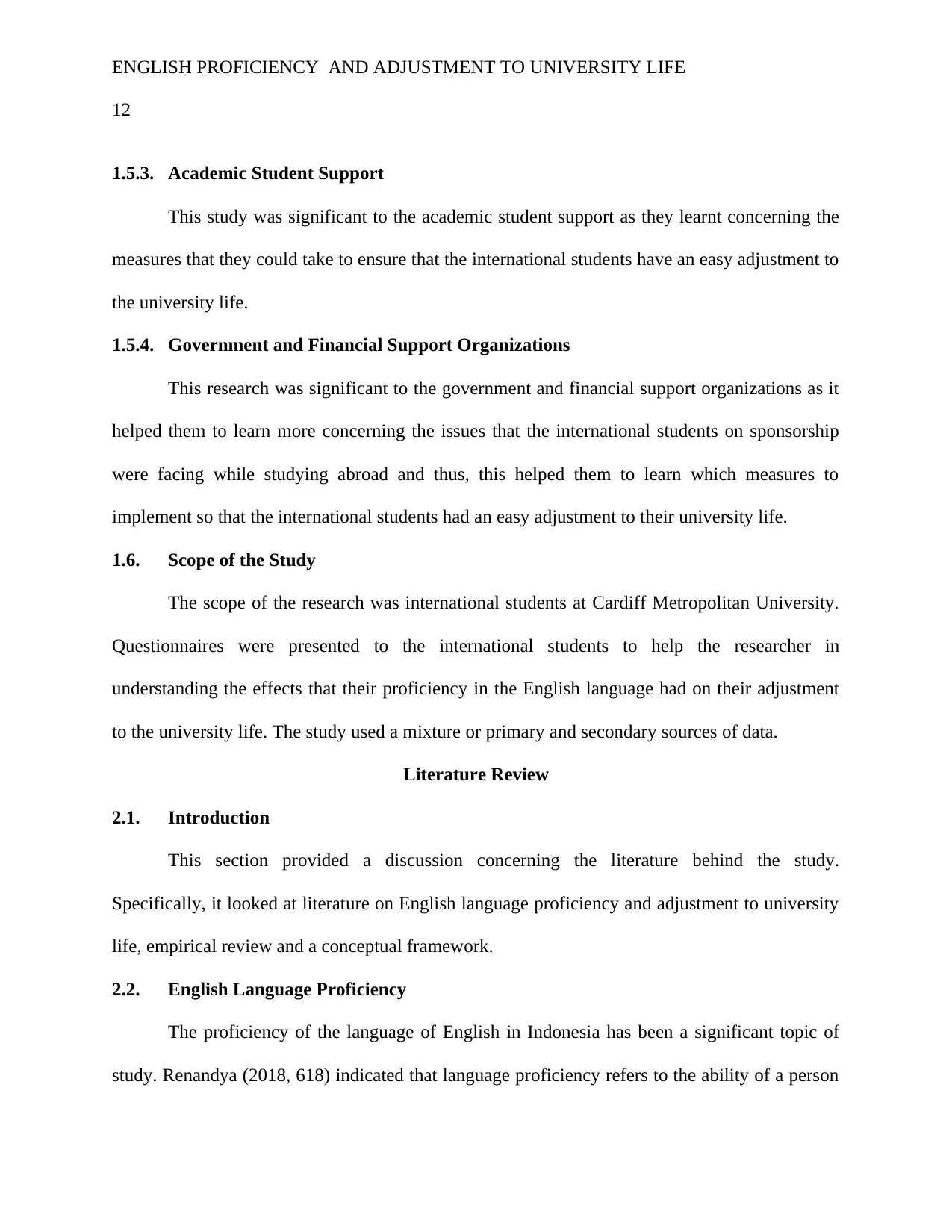
ENGLISH PROFICIENCY AND ADJUSTMENT TO UNIVERSITY LIFE
12
1.5.3. Academic Student Support
This study was significant to the academic student support as they learnt concerning the
measures that they could take to ensure that the international students have an easy adjustment to
the university life.
1.5.4. Government and Financial Support Organizations
This research was significant to the government and financial support organizations as it
helped them to learn more concerning the issues that the international students on sponsorship
were facing while studying abroad and thus, this helped them to learn which measures to
implement so that the international students had an easy adjustment to their university life.
1.6. Scope of the Study
The scope of the research was international students at Cardiff Metropolitan University.
Questionnaires were presented to the international students to help the researcher in
understanding the effects that their proficiency in the English language had on their adjustment
to the university life. The study used a mixture or primary and secondary sources of data.
Literature Review
2.1. Introduction
This section provided a discussion concerning the literature behind the study.
Specifically, it looked at literature on English language proficiency and adjustment to university
life, empirical review and a conceptual framework.
2.2. English Language Proficiency
The proficiency of the language of English in Indonesia has been a significant topic of
study. Renandya (2018, 618) indicated that language proficiency refers to the ability of a person
12
1.5.3. Academic Student Support
This study was significant to the academic student support as they learnt concerning the
measures that they could take to ensure that the international students have an easy adjustment to
the university life.
1.5.4. Government and Financial Support Organizations
This research was significant to the government and financial support organizations as it
helped them to learn more concerning the issues that the international students on sponsorship
were facing while studying abroad and thus, this helped them to learn which measures to
implement so that the international students had an easy adjustment to their university life.
1.6. Scope of the Study
The scope of the research was international students at Cardiff Metropolitan University.
Questionnaires were presented to the international students to help the researcher in
understanding the effects that their proficiency in the English language had on their adjustment
to the university life. The study used a mixture or primary and secondary sources of data.
Literature Review
2.1. Introduction
This section provided a discussion concerning the literature behind the study.
Specifically, it looked at literature on English language proficiency and adjustment to university
life, empirical review and a conceptual framework.
2.2. English Language Proficiency
The proficiency of the language of English in Indonesia has been a significant topic of
study. Renandya (2018, 618) indicated that language proficiency refers to the ability of a person
⊘ This is a preview!⊘
Do you want full access?
Subscribe today to unlock all pages.

Trusted by 1+ million students worldwide
1 out of 62
Related Documents
Your All-in-One AI-Powered Toolkit for Academic Success.
+13062052269
info@desklib.com
Available 24*7 on WhatsApp / Email
![[object Object]](/_next/static/media/star-bottom.7253800d.svg)
Unlock your academic potential
Copyright © 2020–2026 A2Z Services. All Rights Reserved. Developed and managed by ZUCOL.





